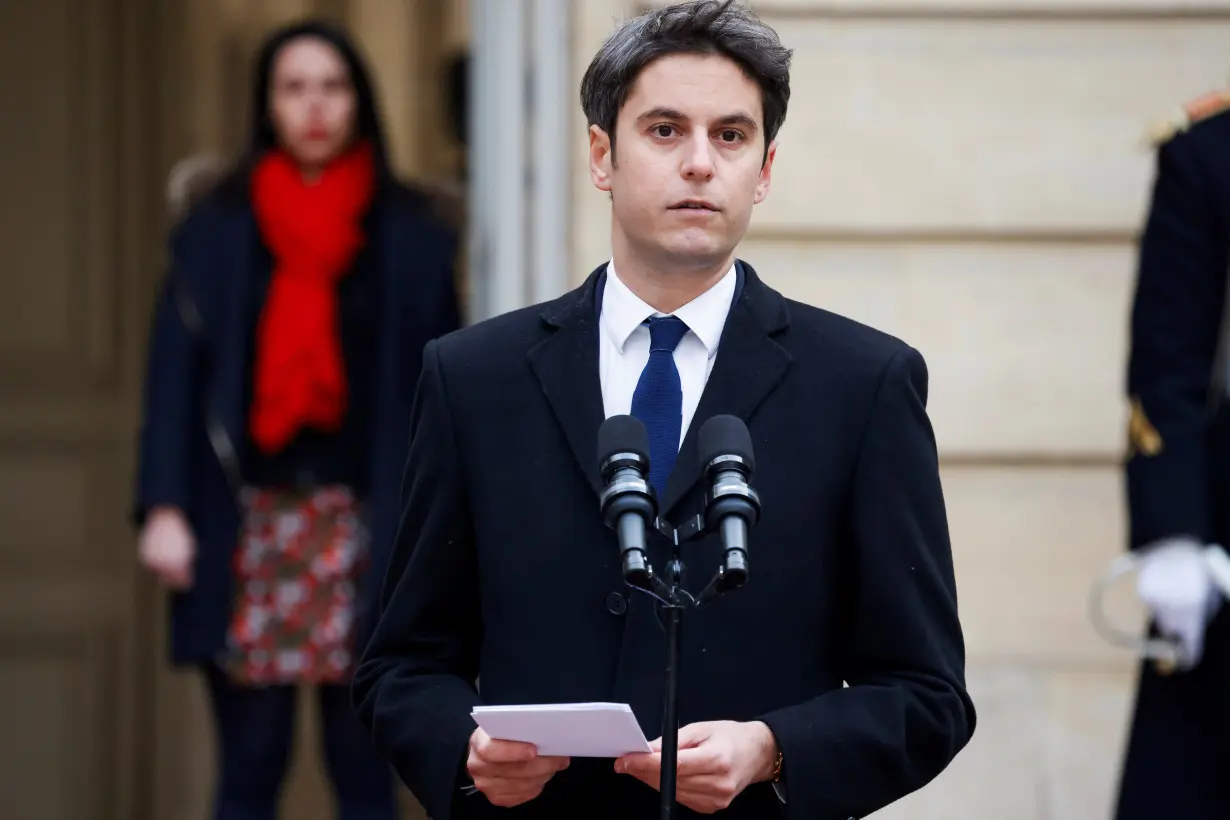PARIS (AP) — French President Emmanuel Macron’s decision to appoint a 34-year-old prime minister surprised many because of his age and relatively short career. But Gabriel Attal has become one of the most prominent and ambitious figures on the French political scene in recent years, saying there’s “nothing greater than serving France.”
The centrist politician is often compared to Macron, France's youngest president, who went from presidential adviser to head of state in a few years. Macron, now 46, was first elected in 2017 at age 39.
Macron's office in a statement said the choice of Attal to replace Elisabeth Borne, 62, shows the president's willingness to allow “new politicians” to emerge — one of the mottos of the so-called “Macronism” that seeks to break with traditional political parties. The office called Attal someone who gets results quickly.
Attal during the handover ceremony on Tuesday described his appointment as “the symbol of audacity."
Attal also is France's first openly gay prime minister. He recently detailed on national television TF1 how he suffered bullying at middle school, including homophobic harassment.
Attal has listed education, security and fighting unemployment amid his top priorities as prime minister.
Political analyst Jerome Jaffré noted a “real change” with Attal’s appointment. Previously, Macron “didn’t want a prime minister with political weight and an existence in the eyes of the public,” Jaffré told RTL radio. But Attal is one of the most famous politicians in France, he said.
French opinion polls show Attal was the most popular minister in the previous government — and is more popular than the president.
As his star has risen, Attal has been discreet about his private life. When his political career took off while he was in a relationship with another politician from Macron’s party, he repeatedly said he didn’t want to make a statement with it.
In his October declaration to the High Authority for Transparency in Public Life, which compiles declarations by high-ranking officials to record potential conflicts of interest, Attal declared having no partner.
He was born in 1989 to a father of Jewish descent, a lawyer and video producer, and a mother of Russian descent working in a video company. He attended a renowned private high school in Paris before studying public affairs at the prestigious Sciences-Po Paris school.
Critics often cite his Paris upbringing when they accuse him of being out of touch with people struggling in the provinces.
Attal became an adviser to the health minister in 2012 under Socialist President Francois Hollande. He joined Macron’s newly launched centrist political movement in 2016. The next year, as Macron was elected president, Attal was elected a lawmaker at the National Assembly, France’s lower house of parliament, from the Paris region.
In 2018, aged 29, he became the youngest member of the French government as a junior minister in charge of education and youth. Notably, he was in charge of launching France’s universal national service program, following a promise by Macron to encourage young people to take on a mission for public good.
In 2020, Attal's career took off when he was appointed government spokesperson. The job gave him media visibility during press briefings following the weekly Cabinet meeting.
He started using social media widely in a way no government official had done before, launching his own Twitch and YouTube live broadcasts that allowed followers to ask him questions.
In 2021, when France adopted a law allowing single women and lesbians access to medically assisted reproduction, Attal posted on Instagram photos of himself as a baby, saying he was born via such a practice and said it “can now benefit millions of other families who until now have been unfairly deprived of it.”
In less than six months at the head of the prestigious education ministry, where he was appointed last summer, Attal made his mark with a series of high-profile announcements.
He announced a ban on long robes in classrooms that took effect with the new school year in September, saying the garments worn mainly by Muslims were testing secularism in schools. He also launched a plan to experiment with uniforms in some public schools.
His TikTok account as education minister collected millions of views, with videos focusing on the fight against cyberbullying and on promoting change at middle and high schools.



